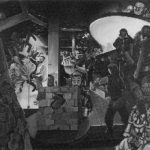Fallen angel: Guy Lardreau's later voluntarism
The French philosopher and erstwhile Maoist militant Guy Lardreau (1947-2008) was the first to admit that much of his work was haunted by a single problem, one posed by the revolutionary political history of the twentieth century. 1 The great revolutions in Russia and China, and several other places inspired by their example, pursued radical […]







